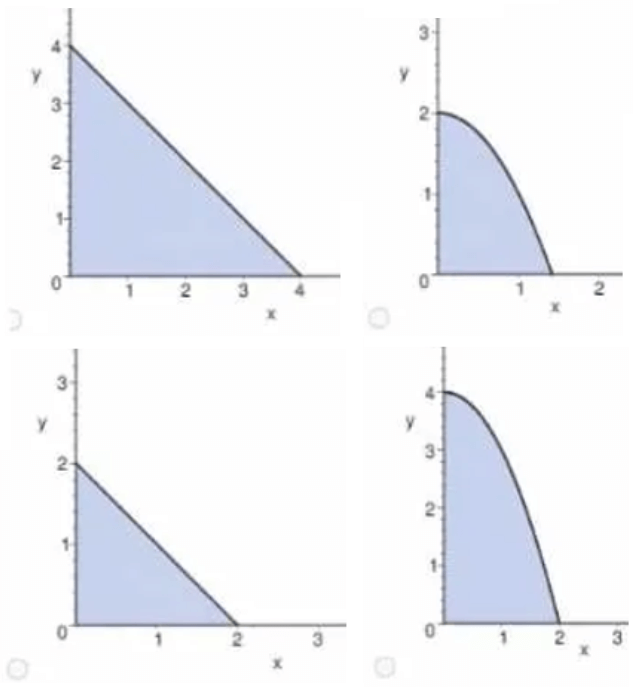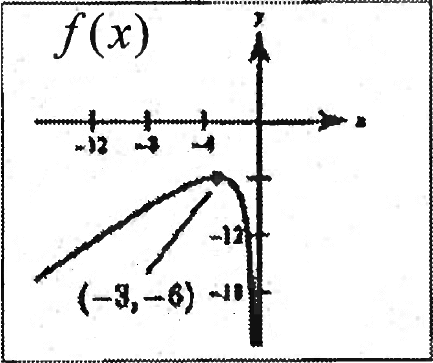ANGLE PAIR RELATIONSHIPS
Relationship 1 :
Two angles are vertical angles, if their sides form two pairs of opposite rays.
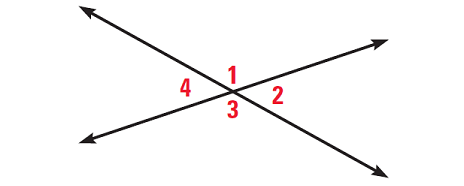
m∠1 and m∠3 are vertical angles
m∠2 and m∠4 are vertical angles
Relationship 2 :
Two adjacent angles are a linear pair, if their non-common sides are opposite rays.
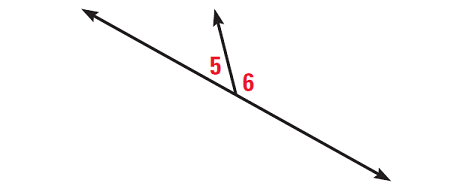
m∠5 and m∠6 are a linear pair.
Example 1 :
Look at the picture shown below and answer the following questions.
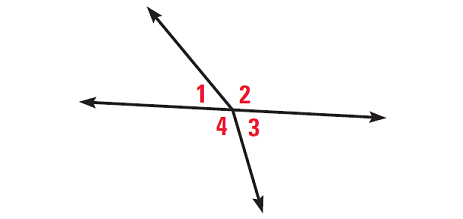
(i) Are m∠2 and m∠3 a linear pair?
(ii) Are m∠3 and m∠4 a linear pair?
(iii) Are m∠1 and m∠3 vertical angles?
(iv) Are m∠2 and m∠4 vertical angles?
Solution :
Solution (i) :
No. The angles are adjacent but their non-common sides are not opposite rays.
Solution (ii) :
Yes. The angles are adjacent and their non-common sides are opposite rays.
Solution (iii) :
No. The sides of the angles do not form two pairs of opposite rays.
Solution (iv) :
No. The sides of the angles do not form two pairs of opposite rays.
Example 2 :
In the stair railing shown at the right, m∠6 has a measure of 130°. Find the measures of the other three angles.
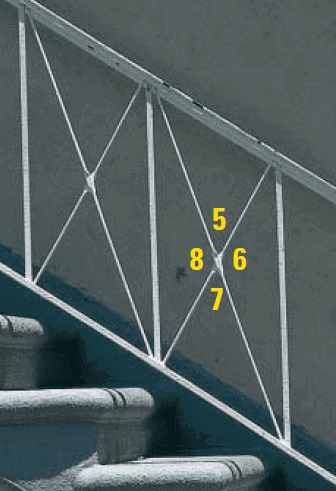
Solution :
m∠6 and m∠7 are a linear pair. So, the sum of their measures is 180°.
m∠6 + m∠7 = 180°
Substitute m∠6 = 130°.
130° + m∠7 = 180°
Subtract 130° from both sides.
m∠7 = 50°
m∠6 and m∠5 are also a linear pair. So, it follows that m∠7 = 50°.
m∠6 and m∠8 are vertical angles. So, they are congruent and they have same measure.
m∠8 = m∠6 = 130°
Example 3 :
In the diagram shown below, Solve for x and y. Then, find the angle measures.
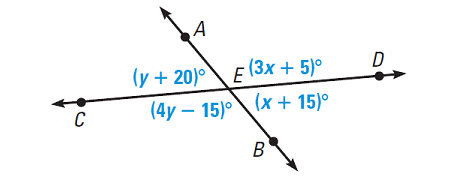
Solution :
Use the fact that the sum of the measures of angles that form a linear pair is 180°.
Solving for x :
m∠AED and m∠DEB are a linear pair. So, the sum of their measures is 180°.
m∠AED + m∠DEB = 180°
Substitute m∠AED = (3x + 5)° and m∠DEB = (x + 15)°.
(3x + 5)° + (x + 15)° = 180°
Simplify.
4x + 20 = 180
Subtract 20 from both sides.
4x = 160
Divide both sides by 4.
x = 40
Solving for y :
m∠AEC and m∠CEB are a linear pair. So, the sum of their measures is 180°.
m∠AEC + m∠CEB = 180°
Substitute m∠AEC = (y + 20)° and m∠CEB = (4y - 15)°.
(y + 20)° + (4y - 15)° = 180°
Simplify.
5y + 5 = 180
Subtract 5 from both sides.
5y = 175
Divide both sides by 5.
y = 35
Use substitution to find the angle measures :
m∠AED = (3x + 5)°
= (3 • 40 + 5)°
= 125°
m∠DEB = (x + 15)°
= (40 + 15)°
= 55°
m∠AEC = ( y + 20)°
= (35 + 20)°
= 55°
m∠CEB = (4y - 15)°
= (4 • 35 - 15)°
= 125°
So, the angle measures are 125°, 55°, 55°, and 125°. Because the vertical angles are congruent, the result is reasonable.
Kindly mail your feedback to v4formath@gmail.com
We always appreciate your feedback.
©All rights reserved. onlinemath4all.com
Recent Articles
-
AP Calculus AB Problems with Solutions (Part - 10)
Feb 11, 25 11:15 AM
AP Calculus AB Problems with Solutions (Part - 10) -
AP Calculus AB Problems with Solutions (Part - 11)
Feb 11, 25 11:09 AM
AP Calculus AB Problems with Solutions (Part - 11) -
AP Calculus AB Problems with Solutions (Part - 9)
Feb 10, 25 06:02 PM
AP Calculus AB Problems with Solutions (Part - 9)
